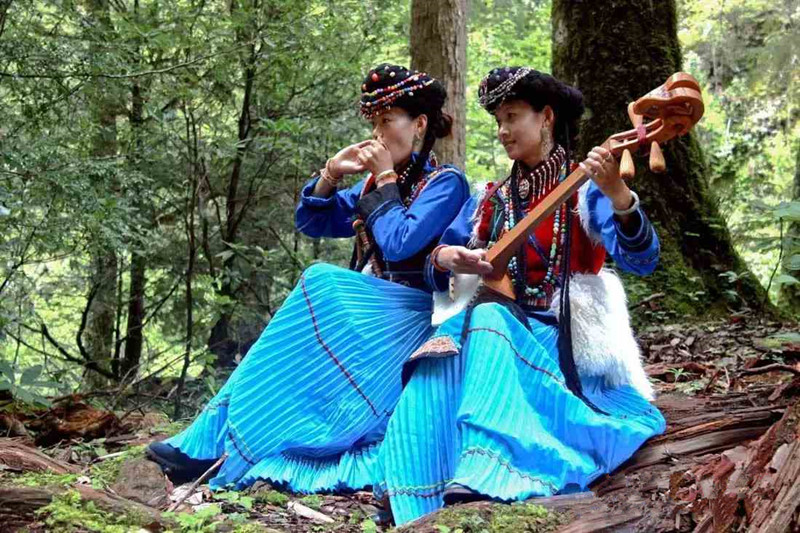
Lanping County Festivals and Events
Festival is the important way to carry on the traditional culture, such as the ritual, sacrifice ceremony, costume, art, dinning etc. Most elements of ethnic culture can be seen in their traditional festivals. If you want to know more about ethnic minorities, featured festivals should not be missed.
1.Danian (The New Year) of Pumi People 大年
Danian, Wuxi in the Pumi language, is the most lively and most ceremonious festival among the Pumi people. The celebration usually starts from the first or second ten days of the 12th lunar year. On the first day of 1st lunar month, people will fire to the sky to welcome coming of the New Year, In the daytime, they will shoot at targets, having horsing, go swimming and sing antiphonal songs. At night, they will dance and sing.
2.Kuoshi Festival(New Year Festival) of Lisu People 阔时节
The Kuoshi Festival, the Lisu New Year, is the biggest festival among the Lisu people. Regions different, the time of celebration also differs. Generally, the festival lasts from the 5th day of the 12th lunar month to 10th day of 1st lunar month, a period the Lisu people call ‘the Month of Celebration’. During the festival, religious activities of offering sacrifices will be carried out and such amusements as crossbow, dancing, pole climbing and antiphonal-style singing will be held.
3.Zaotanghui(Bathing) Festival of Lisu People 澡堂会
The Bathing Gathering, also called ‘Tangquanhui’ 汤泉会, are yearly bathing gathering held in spring among the Lisu people living in Nujiang. In the period from 2nd to 6th day of the 1st lunar month, the Lisu people will carry with them luggage and food, and go to the hot springs called ‘the 16 Hot Springs in the Valley’ to have an amazing curing effects and a bathing here can rid them of a year’s pains and misfortunes. In this spring bathing period, song competitions are also held.
4.The Festival f Climbing Sword-poles of Lisu People刀杆节
It is one of the traditional festivals among the Lisu people, in memory of Wang Ji 王骥, a minister of the Defense Minister in the Ming Dynasty. The story goes that during the time when Wang Ji was an officer in command to garrison the frontiers, he and his soldiers fought bravely, daring to climb a mountain of swords and plunging into a sea of flames. His courage was highly respected and the date of his death, the 8th of August on the Chinese lunar Calendar, was named the The Festival f Climbing Sword-poles. On this day, the Lisu people hold such activities as climbing sword-poles and plunging into a sea of flames to show their bravery.

 7 Days GolfingTour
7 Days GolfingTour
 8 Days Group Tour
8 Days Group Tour
 8 Days Yunnan Tour
8 Days Yunnan Tour
 7 Days Shangri La Hiking
7 Days Shangri La Hiking
 11 Days Yunnan Tour
11 Days Yunnan Tour
 6 Days Yuanyang Terraces
6 Days Yuanyang Terraces
 11 Days Yunnan Tour
11 Days Yunnan Tour
 8 Days South Yunnan
8 Days South Yunnan
 7 Days Tea Tour
7 Days Tea Tour
 8 Days Muslim Tour
8 Days Muslim Tour
 12 Days Self-Driving
12 Days Self-Driving
 4 Days Haba Climbing
4 Days Haba Climbing
 Tiger Leaping Gorge
Tiger Leaping Gorge
 Stone Forest
Stone Forest
 Yunnan-Tibet
Yunnan-Tibet
 Hani Rice Terraces
Hani Rice Terraces
 Kunming
Kunming
 Lijiang
Lijiang
 Shangri-la
Shangri-la
 Dali
Dali
 XishuangBanna
XishuangBanna
 Honghe
Honghe
 Kunming
Kunming
 Lijiang
Lijiang
 Shangri-la
Shangri-la
 Yuanyang Rice Terraces
Yuanyang Rice Terraces
 Nujiang
Nujiang
 XishuangBanna
XishuangBanna
 Spring City Golf
Spring City Golf
 Snow Mountain Golf
Snow Mountain Golf
 Stone Mountain Golf
Stone Mountain Golf












